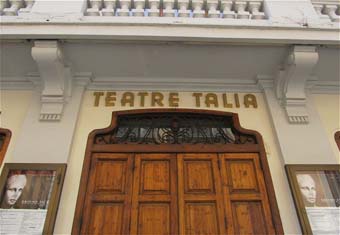
The Economics Applied to Culture Research Unit of the University of Valencia, coordinated by Professor Pau Rausell, the Interuniversity Institute for Local Development, developed an experiment in which consumers choose at the end of the theatrical representation to pay what they consider appropriate . The motto is 'Nosaltres posem the Teatre i tu the preu' (The theatre is on us, the price is on you). The proposal is released in the theater Talia, which has in the lineup 'Un deu salvatge' (A savage God) by Yasmina Reza.
In recent years it has been opened discussion on the prices of cultural goods and services. A debate that goes from the world of media, cultural institutions and cultural policy to the academic sphere.
The problem of 'the price of culture' affects many dimensions of the cultural system. From the perspective of cultural policy, the price assigned to cultural goods and services provided involve the co-payment that will be charged by the beneficiaries of such provision, but also in budgetary tensions situation the price determines the threshold of viability of the public offering, and the scope and impact of barriers to access of specific audiences.
Some of these cultural agents launch a complaint alleging that the emergence of public interventions with offers below market prices have accustomed users to a low willingness to pay, as they have internalized that culture is or has to be free or very low prices. The same complaint bidders throwing digitizable cultural goods (music, text, audio, video) from the effects of the extension of the so-called piracy, which discourages the payment of the price, and in the one case as in the other reduces incentives to the creators (and the entire mediation system) to create and provide cultural goods and services.
In this context, recent experiences suggest that it is the consumer who pays for what he/she thinks is right (Pay What You Want). The experiences are varied: from well known bands offering Internet download album on paying what is considered appropriate, to small restaurants offering the possibility to freely decide what you want to pay after the end of the meal. The range of results of experiences is also very broad, and these range from spectacular successes that more money is collected by the conventional route, to equally resounding failures. However, a feature common to all experiences is that a lot of consumers pay some amount for the good or service enjoyed when you could have gotten for free, thus violating the assumptions of conventional economic theory.
The experiment of 'Nosaltres posem the Teatre i tu el preu', has several objectives. First, disabling the role of price as a barrier to entry into a theater play and try that the expression of the assistant becomes a deliberate process value signal. In addition, checking the performance of the theater audience and the determinants of the willingness to pay for theatre in the city of Valencia. Finally, checking the effect of the language (Valencia) on the willingness to pay.
The proposal arises in the context of Talia theatrical supply, which premieres 'Un deu salvatge' by Yasmina Reza, and performed by Pilar Valencia Almeria, Empar Canet, Jaime Linares, and Pep Ricart. They offer more than 30 performances between 18 September and 20 October, which initially proposed that one of them is with the system of "pay what you think", namely September 27. Depending on the progress of the experience you can think of expanding their reach.
This experiment complicity arises in Talia Theatre in collaboration with Culturarts, which analyzes the possibilities of moving the analysis to the tender offer. The results will be incorporated into several research and dissertations such as Francesc Felipe, who discusses the role of language in cultural uses, Luis Bellvis on the viability and sustainability of the theater companies, or Chuan LI, which compares the availability payable in different geographical areas (China and Spain) or cultural theaters and museums.
Last update: 20 de september de 2013 09:06.
News release



















